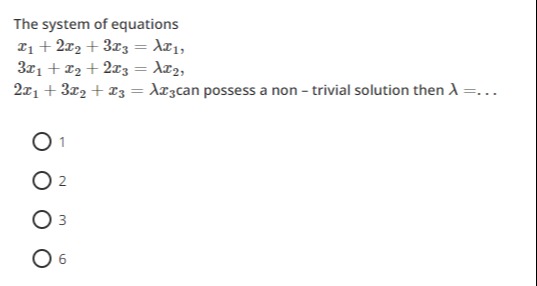Question
Question: The system of equations $x_1 + 2x_2 + 3x_3 = \lambda x_1$, $3x_1 + x_2 + 2x_3 = \lambda x_2$, $2x...
The system of equations
x1+2x2+3x3=λx1,
3x1+x2+2x3=λx2,
2x1+3x2+x3=λx3 can possess a non-trivial solution then λ=...

1
2
3
6
6
Solution
The given system of equations can be written in matrix form as Ax=0, where x=x1x2x3 and A is the coefficient matrix:
A=1−λ3221−λ3321−λ
A homogeneous system of linear equations Ax=0 has a non-trivial solution if and only if the determinant of the coefficient matrix A is zero, i.e., det(A)=0.
Calculating the determinant of A and setting it to zero allows us to solve for λ.
det(A)=(1−λ)1−λ321−λ−23221−λ+3321−λ3
det(A)=(1−λ)[(1−λ)2−6]−2[3(1−λ)−4]+3[9−2(1−λ)]
det(A)=(1−λ)(λ2−2λ−5)−2(−1−3λ)+3(7+2λ)
det(A)=−λ3+3λ2+15λ+18
Setting det(A)=0, we get:
−λ3+3λ2+15λ+18=0
λ3−3λ2−15λ−18=0
By testing the given options, we find that λ=6 is a root of this equation:
63−3(6)2−15(6)−18=216−108−90−18=0
Therefore, the system of equations has a non-trivial solution when λ=6.
